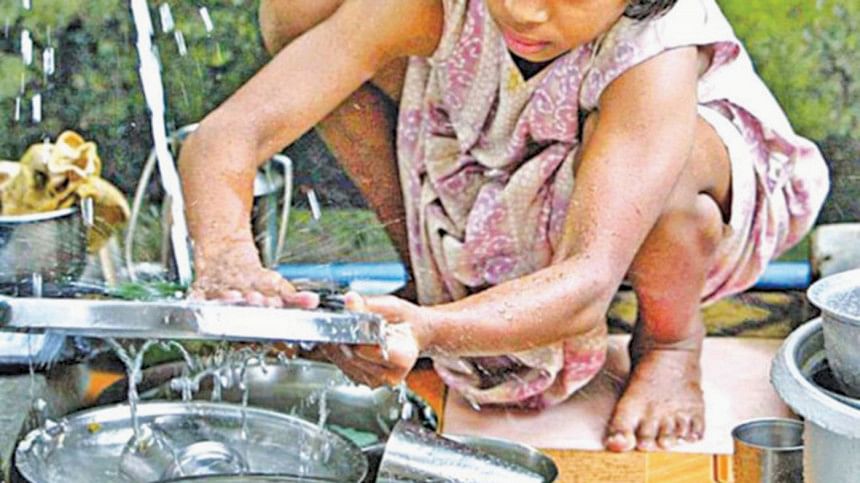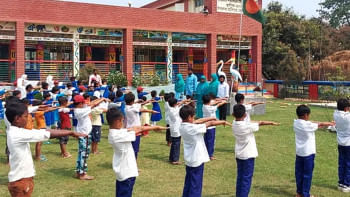Effective protection of domestic child workers: implementation awaits

Incessantly, every few months we come across news reports of abuse of domestic workers in Bangladesh, especially related to children. Over the years, few of these incidents have come under the spotlight, and has accounted for advocacy against child labour - which resulted in significant judicial activism in Bangladesh. Studies conducted by different organisations show that, between January 2020 and June 2021, there were 70 reported incidents involving violence against domestic workers, of which 51 incidents involved workers under the age of 18 and, of that, 22 incidents involved deaths of domestic child workers. However, to this day, many more incidents go unreported without any retribution, and over time, our desensitisation to the recurring incidents has faded the effective implementation of protection of domestic child workers.
The problem relating to the abuse of domestic child workers is real and eminent and, although many noteworthy initiatives have been taken by the Government in this regard, it is felt that more steps are required in practice to stop or reduce such abuse of domestic workers. It is, perhaps, appropriate and timely to revisit the important principles and practical directions set by the Hon'ble High Court Division in the landmark case of Bangladesh National Women Lawyers Association (BNWLA) v the Cabinet Division, represented by Cabinet Secretary, Bangladesh Secretariat. In this case, the High Court Division (comprising of Justice Md. Imman Ali and Justice Sheikh Hassan Arif) deliberated on these issues and issued a 10-point directive to the relevant Government authorities with the sincere aim of regulating the employment of children as domestic workers and setting up an elaborate plan to eradicate child labour.
In the case, an application was filed under Article 102 of the Constitution to bring the plight of child domestic workers to the fore, based on an incident of abuse of a child domestic worker, only 10 years of age. The High Court, upon closely scrutinising the facts, stipulated that the Government should take immediate steps to prohibit employment of children up to the age of 12 from any type of employment, including employment in the domestic sector - particularly with the view of ensuring that children up to the age of 12 attend school, which would resultantly make the provision and concept of compulsory primary education more meaningful. The Court also addressed that, as it is impracticable to blatantly ban child labour altogether, education and training of domestic workers aged between 13 and 18 must be ensured by the employers, either by allowing them to attend educational or vocational training institutes, or by alternative domestic arrangements suitable to the concerned worker. In connection thereto, the Court importantly noted that, while the National Child Policy defines 'child' as anyone up to the age of 18, the Bangladesh Labour Act 2006 (BLA) defines a child as anyone below the age of 14 years. The High Court rightfully stressed that the BLA should be amended to bring its definition of child in line with the said policy. It is noteworthy that the Children's Act 2013 also defines 'child' as any person under the age of 18.
The BNWLA case also stressed on the necessity of including domestic workers within the definition of 'worker' in the BLA – especially due to the long hours that these workers are generally exposed to within the four walls of the employer. 'Domestic servants' are specifically excluded from the purview of the BLA, and as a result, these workers do not enjoy any rights afforded by the BLA and have no redress for non-payment of salary, violation of conditions of work, etc. The Court noted that private homes are closed environments that expose domestic workers to physical, sexual, and emotional abuse, "all of which are well known risk factors or emotional disorders." Inclusion of the domestic workers within the definition of 'worker' in the BLA will ensure that the workers in the domestic sector enjoy all the benefits guaranteed by the laws. The Court stressed that the laws must also ensure proper medical treatment and compensation by the employers for all domestic workers, who suffer any illness, injury, or fatality during the course of their employment or as a result of it.
Apart from the legislative reforms, the BNWLA case also focused on practical steps to curb the spread of domestic worker abuse by suggesting strict monitoring and registration of domestic workers. The Court referred to The Domestic Servants' Registration Ordinance 1961, which required all persons rendering domestic services within certain parts of Dhaka to register with their respective police stations and stressed that the current situation also demands to put in place a system of registration and monitoring of all persons engaged in domestic work - it is only then that the mandate of the Constitution will be fulfilled. On this note, the Court directed the Government to ensure mandatory registration of all child domestic workers by their employers, and to maintain an effective system through the respective local Government units for tracking down each and every change of employment or transfer of all the registered domestic workers from one household to another. The parents must also be required to register the name and address of the person to whom the child is being sent for the purpose of employment. Although the requirement of registration is clearly stipulated in the Domestic Worker Protection and Welfare Policy, more effective steps need to be taken by the appropriate authorities to ensure its implementation so that it becomes a routine task in every household.
Lastly, on the health and safety of domestic workers, the BNWLA case stressed that the Government should take steps to promulgate laws making it mandatory for the employers to ensure health check-ups of domestic workers at least once in every 2 months and the legal framework should be strengthened in order to ensure all the benefits of regulated working hours, rest, recreation, salary etc. of domestic workers. The laws should also ensure proper medical treatment and compensation by the employers for all domestic workers who may suffer any illness, injury, or fatality during the course of their employment or as a result of it. Although the existing Domestic Worker Protection and Welfare Policy incorporates most of these points, it is felt that bringing them under a formal statutory instrument would provide better protection for these workers.
The above directions and guidance provided by the Court still makes the BNWLA case a landmark case in this field. From the case (which frames the modus operandi towards eradicating child labour), it appears that the Courts are ready and equipped to give the much-deserved protection to domestic workers, especially children. Given that noteworthy policy steps have already been taken by the Government to eradicate domestic worker abuse and child labour, it is concerning that cases of abuse are still on the rise. It is felt that laws and policies remain largely ineffective unless accompanied by stricter enforcement. The enforceability of the relevant instruments must be ensured in order to maximise the effectiveness of the policies concerned. Also, the legal and practical steps suggested by the BNWLA case must be given immediate implementation in the form of a formal statute (if not being done already).
The writer is an Advocate of the Supreme Court of Bangladesh, assisted by his research associate Anika Zaima.

 For all latest news, follow The Daily Star's Google News channel.
For all latest news, follow The Daily Star's Google News channel. 



Comments